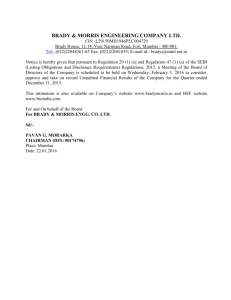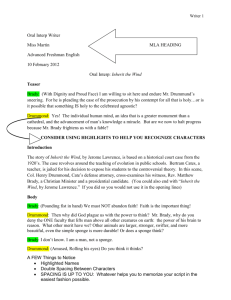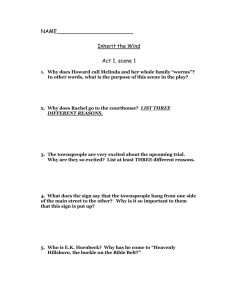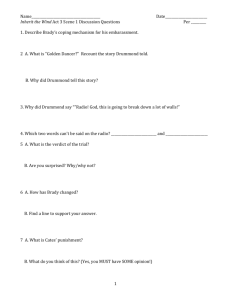Government Enforcement Alert Brady
advertisement
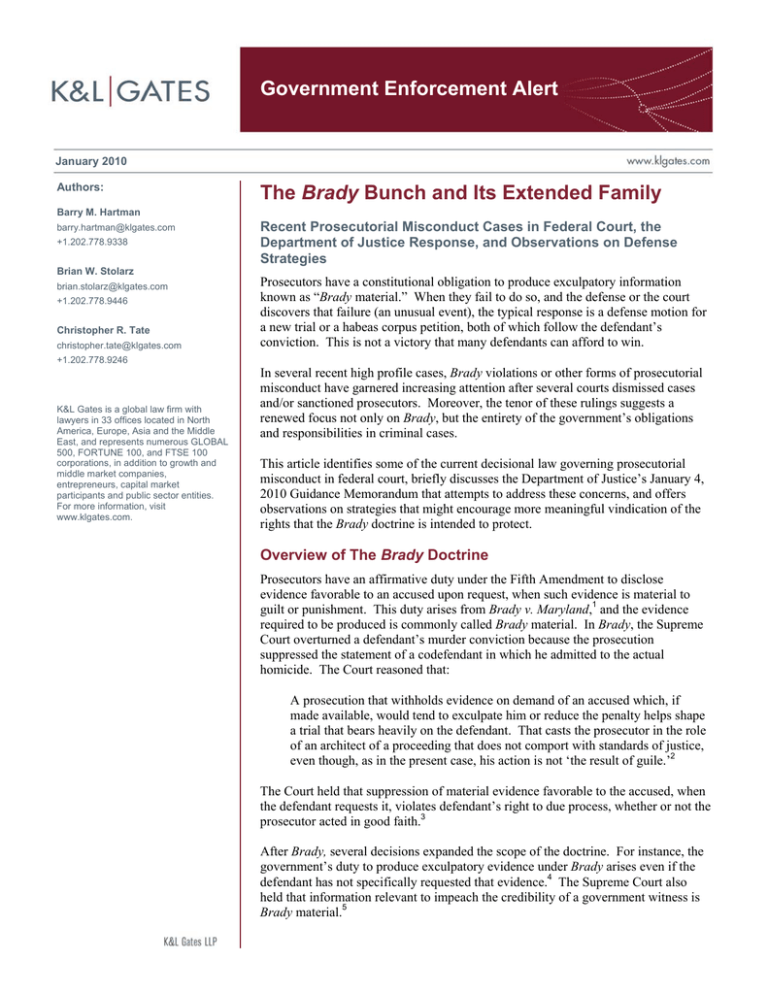
Government Enforcement Alert January 2010 Authors: The Brady Bunch and Its Extended Family Barry M. Hartman barry.hartman@klgates.com +1.202.778.9338 Recent Prosecutorial Misconduct Cases in Federal Court, the Department of Justice Response, and Observations on Defense Strategies Brian W. Stolarz brian.stolarz@klgates.com +1.202.778.9446 Christopher R. Tate christopher.tate@klgates.com Prosecutors have a constitutional obligation to produce exculpatory information known as “Brady material.” When they fail to do so, and the defense or the court discovers that failure (an unusual event), the typical response is a defense motion for a new trial or a habeas corpus petition, both of which follow the defendant’s conviction. This is not a victory that many defendants can afford to win. +1.202.778.9246 K&L Gates is a global law firm with lawyers in 33 offices located in North America, Europe, Asia and the Middle East, and represents numerous GLOBAL 500, FORTUNE 100, and FTSE 100 corporations, in addition to growth and middle market companies, entrepreneurs, capital market participants and public sector entities. For more information, visit www.klgates.com. In several recent high profile cases, Brady violations or other forms of prosecutorial misconduct have garnered increasing attention after several courts dismissed cases and/or sanctioned prosecutors. Moreover, the tenor of these rulings suggests a renewed focus not only on Brady, but the entirety of the government’s obligations and responsibilities in criminal cases. This article identifies some of the current decisional law governing prosecutorial misconduct in federal court, briefly discusses the Department of Justice’s January 4, 2010 Guidance Memorandum that attempts to address these concerns, and offers observations on strategies that might encourage more meaningful vindication of the rights that the Brady doctrine is intended to protect. Overview of The Brady Doctrine Prosecutors have an affirmative duty under the Fifth Amendment to disclose evidence favorable to an accused upon request, when such evidence is material to guilt or punishment. This duty arises from Brady v. Maryland,1 and the evidence required to be produced is commonly called Brady material. In Brady, the Supreme Court overturned a defendant’s murder conviction because the prosecution suppressed the statement of a codefendant in which he admitted to the actual homicide. The Court reasoned that: A prosecution that withholds evidence on demand of an accused which, if made available, would tend to exculpate him or reduce the penalty helps shape a trial that bears heavily on the defendant. That casts the prosecutor in the role of an architect of a proceeding that does not comport with standards of justice, even though, as in the present case, his action is not ‘the result of guile.’2 The Court held that suppression of material evidence favorable to the accused, when the defendant requests it, violates defendant’s right to due process, whether or not the prosecutor acted in good faith.3 After Brady, several decisions expanded the scope of the doctrine. For instance, the government’s duty to produce exculpatory evidence under Brady arises even if the defendant has not specifically requested that evidence.4 The Supreme Court also held that information relevant to impeach the credibility of a government witness is Brady material.5 Government Enforcement Alert However, whether evidence is material is often a major issue. For evidence to be “material” under Brady, a defendant must show that it is the sort of evidence that might have affected the outcome of the trial;6 in other words, that there is a “reasonable probability that, had the evidence been disclosed to the defense, the result of the proceeding would have been different.”7 The defendant need not show, however, that an acquittal would have resulted with the disclosure of the withheld evidence.8 A defendant must also show that the material evidence was in the prosecution’s “possession.” That does not mean the information is literally in the prosecutor’s hands. The government has an affirmative duty to search for Brady material, an obligation which extends not only to the Department’s prosecutors, but also to persons and agencies working on behalf of the government in the case, colloquially known as the “prosecution team.”9 This standard has become increasingly important in the era of white collar prosecutions, where there are often parallel civil and criminal proceedings involving multiple federal agencies in addition to the Department of Justice and United States Attorneys Office which may expand the members of the prosecution team to include attorneys from the agency handling the civil case.10 The Brady Bunch —Recent Notable Cases The fulfillment by the government of its Brady obligations in modern criminal practice is often mechanical, and sometimes perfunctory. Where there are errors, they are often difficult to find and, even when they are, the remedy for them may be largely ineffective. Moreover, it is difficult to determine how often Brady issues arise to affect the outcome of a case. Given the relatively small number of reported Brady decisions, it may be that many cases in which Brady violations have occurred have not been reported. It is not unreasonable to imagine that the courts have presided over a number of prosecutions where there has been an incomplete disclosure of Brady material, which was not discovered until after trial, at which point the trial court ordered a new trial, but did so in an unreported opinion. Establishing a Brady violation is often more the product of fortuitous timing or events that bring the undisclosed evidence to light rather than through the traditional discovery process. But even then, materiality is considered after the fact, not at the time of the trial in question. More recently, however, a number of widely reported cases demonstrate that some courts have taken a far closer look at Brady and ordering dismissals of cases (which for double jeopardy purposes are often final) and not new trials. On July 29, 2008, a federal grand jury in Washington, D.C. indicted then-Senator Ted Stevens for alleged violations of the Ethics in Government Act, based on allegedly false statements on mandated financial disclosure forms. After the District Court denied a motion for a mistrial based on allegations that the prosecution had withheld exculpatory evidence, the jury returned a guilty verdict on all counts. Several months later, an FBI agent filed a whistleblower complaint with the Bureau, which the government initially filed under seal but was later unsealed.11 Among other things, the agent reported that prosecuting attorneys concealed and inappropriately redacted notes from an FBI Form 302 report of agents’ interviews with key prosecution witnesses.12 Most notable among these redactions was the contradiction by a chief government witness of his testimony at trial in which he had inculpated Mr. Stevens. On February 13, 2009, the District Court held that this was Brady information which the government was required to produce to the defense, and held the prosecution team in contempt of court for their violation of Mr. Stevens’ Brady rights. On April 1, 2009, the government filed a motion to set aside the verdict and dismiss the charges against Mr. Stevens. On April 7, 2009 the District Court granted the motion and ordered an investigation into the government’s handling of the case. In so doing, the District Court stated that “I have never seen anything approaching the mishandling and misconduct that I have seen in this case.” 13 In another recent case a District Court found an extensive pattern of misconduct by the prosecutor, including suppression of multiple DEA investigative notes containing exculpatory information. It ordered the payment of attorneys’ fees for the defendant (who had been acquitted of distributing controlled substances), a reprimand of the prosecuting attorney, and an investigation by the January 2010 2 Government Enforcement Alert Department of Justice.14 The court’s opinion noted that the prosecutor’s misconduct in that case was as pervasive as it was disappointing, extending from the multiple Brady violations to undisclosed tapings of conversations between the defendant and his counsel, as well as a “vindictive” Superseding Indictment.15 In another recent, high-profile case alleging criminal violations of environmental laws, a District Court held that where a prosecutor failed to turn over documents regarding a government witness that evidenced an extreme bias against defendants, such failure constituted a violation of Brady and Giglio, even where the government did not necessarily act in bad faith.16 The District Court noted that “the failure to disclose documents related to [the witness] is merely the latest manifestation of a systemic problem, i.e., that the Department of Justice charged a case larger than the one it prepared to prosecute.” 17 Although the District Court denied motions to dismiss the charges, it issued an unusual remedy - an instruction to the jury that the government witness was not to be relied upon at all for one defendant, that the jury should view his testimony as to the other defendants with “great skepticism and with greater caution than that of other witnesses,” and that “the Department of Justice and the United States Attorney’s Office have violated their constitutional obligations to the defendants, they have violated the Federal Rules of Criminal Procedure, and they have violated orders of the Court.”18 The jury acquitted all defendants of all charges. In addition to these high-profile cases, there are other recent reported cases involving Brady violations that demonstrate various forms of prosecutorial misconduct.19 The Extended Brady Family: Other Prosecutorial Misconduct Although not a case of withholding Brady evidence, a recent series of cases in the Central District of California illustrates both serious prosecutorial misconduct and the effort necessary from defense counsel and courts to remedy it.20 Beginning in 2008, the government issued a series of civil complaints and obtained criminal indictments against former employees and founders of Broadcom Corporation based on irregularities in stock option compensation. The Court held that the government intimidated and improperly influenced the three witnesses critical to the defendants, and violated the defendants’ right to compulsory process for witnesses in their own defense. The court cited the following examples: • After one former VP refused to cooperate with the investigation, the lead prosecutor telephoned the general counsel of her new employer and “made inappropriate statements to him that caused [her] to lose her job.” The government interrogated the former VP on 26 separate occasions and threatened her with additional sanctions if she was unable to implicate another person. As a result, the former VP entered into a plea agreement that the court described as “containing a questionable factual basis” and was a plea to a felony because the government told her it “looked more convincing to a jury.” • The government delayed its charging decision against Broadcom’s former general counsel for two years, leaving him “hanging in the wind.” After the court granted the general counsel immunity so that he could be a defense witness, the prosecutor negotiated with him about the content of his testimony, promising a “soft cross,” or an easier time on the witness stand if he implicated another person. • The lead prosecutor leaked to the media that one person was being uncooperative after submitting to 30 “grueling” interrogations with the lead prosecutor. The lead prosecutor also placed pressure on the Broadcom board to terminate that person from the company he founded. Finally, the prosecutor crafted an “inflammatory” indictment that mentioned him by name 72 times as an “unindicted coconspirator” – which is improper under the United States Attorney’s Manual, the guidebook for federal prosecutors21 – after which the individual pled guilty “to a crime he did not commit” and agreed to pay a $12 million fine. The court delivered a stinging opinion from the bench, dismissing with prejudice the indictments January 2010 3 Government Enforcement Alert and the parallel civil complaints brought by the SEC against two persons – an extremely unusual result.22 The court concluded his opinion dismissing the criminal case with a hypothetical: I have a solemn obligation to hold the government to the constitution. I’m doing nothing more and nothing less. And I ask my critics to put themselves in the shoes of the accused. You are charged with serious crimes and, if convicted on them, you will spend the rest of your life in prison. You only have three witnesses to prove your innocence and [the] government has intimidated and improperly influenced each one of them. Is that fair? Is that justice? I say absolutely not.23 Finally, several years ago the government was embarrassed by its tactics of pressuring a company not to pay for the legal defense costs of several defendants.24 Response from the Department of Justice Attorney General Eric Holder recently promised federal trial judges that Department of Justice attorneys would receive additional training on their discovery obligations, and that he would work on streamlining the process through which the Department’s Office of Professional Responsibility would investigate complaints of misconduct against prosecutors.25 Additionally, a working group was formed to undertake a review of the department’s policies, practices and training related to criminal case management and discovery. On January 4, 2010, the department issued a tenpage Guidance Memo for prosecutors regarding criminal discovery.26 The Guidance Memo calls for enhanced training, online resources, a new handbook for prosecutors, and the evaluation of case management software and cataloguing practices to streamline discovery review. The Guidance Memo also requires divisions handling criminal matters to develop (or in divisions in which a policy exists, to “re-visit”) a discovery policy to be followed in that division for criminal discovery. Such standards must comport with local rules and precedent, and while they may allow for flexibility from the standards in certain cases, such flexibility must be standardized through a review process. This policy must be completed by March 31, 2010. The Guidance Memo also set forth specific steps for prosecutors to take regarding discovery, most of which were largely taken from the United States Attorney’s Manual, which has existed for years.27 These include: (1) reviewing information from the “prosecution team;” (2) ensuring that specific categories of information is to be reviewed; (3) establishing whether Giglio, or impeachment evidence, exists by having a “candid conversation” with federal agents who investigated the case; (4) providing “material variances” in a witness’ statement to the defendant, and (5) establishing time frames by which exculpatory information, impeachment material, and Rule 16 material is to be produced.28 The Guidance Memo is “prospective” and like all Department of Justice policies, is not intended to have the force of law or to create or confer any rights, privileges or benefits on defendants.29 Thus, although the goals of the Guidance Memo are laudable, it remains to be seen whether it will ensure real and sustainable change in the criminal discovery process. New Rules of Criminal Procedure or statutes that codify protections for a criminal defendant rather than discretionary policies created by the prosecutors themselves may be needed.30 Responses by Defense Attorneys Some defense attorneys have successfully obtained greater Brady disclosure and other evidence when they were able to build a record to convince the court of real-time violations rather than litigating the issue post-conviction. Examples of these strategies include the following: Be specific. Requests for Brady and Giglio materials should be as specific as possible. For example, interview notes of investigating agents, scientific reports, settlement negotiations with other relevant parties, documents generated by other federal agencies that investigated the matter, and other targeted requests of known or suspected Brady material contained therein are far more powerful than general requests for exculpatory information, both in ensuring the original disclosure, and in creating a favorable record should the disclosure be nonexistent, insufficient, or a document is later found to have been improperly withheld. January 2010 4 Government Enforcement Alert Reject Jencks as a shield to Brady. The government often claims that a prior statement of a witness is provided in a timely manner if provided pursuant to the Jencks Act (18 U.S.C. §3500). Often this is only disclosed a week or less before trial. But various federal District and Circuit courts that have held that Brady material within Jencks Act statements trumps the statutory requirements of the Jencks Act may be appropriate.31 inefficiencies and bureaucratic disorganization in the prosecutor’s office, rather than malice or harassment. Gaps in discovery, particularly in areas that already contained helpful information, should be explored insistently and a proper record made of any requests to the government. Conclusion Lawyers and interested parties on both sides of counsel table are rightfully shocked when Brady violations and other instances of prosecutorial misconduct come to light. One of the defense counsel in the Broadcom litigation, a former prosecutor, noted that the “most enjoyable” part of representing the government was “the presumption of credibility…you are cloaked with it from the moment that you walk into the courtroom. Usually, from the judge’s perspective, frankly from the clerk’s perspective, it’s your credibility to lose.”32 Append other discovery requests to the Brady request. Specifically, Federal Rule of Criminal Procedure 16(a)(1)(E)(i) states that the government must permit inspection of a document if “the item is material to preparing the defense.” Thus, if you are unsure as to whether a sought document contains Brady material or would traditionally qualify as such material, you may consider asserting this right as another potential basis for the government to provide the document. Brady violations are one instance among many others in which a prosecutor can deservedly lose some of that credibility. While a judge and the public may give that benefit of the doubt to the government, it is a defense counsel’s duty not only to challenge the assumption that a prosecutor is acting in good faith, but to proactively question the government’s actions, particularly when it comes to exculpatory evidence and the safeguards required for a fair judicial process. Document the government’s response through status reports or detailed letters, depending on local practice. In the Broadcom case, the court finally took note after counsel exposed a large and pervasive mode of prosecutorial misconduct. You must review what you get. As the court noted in the W.R. Grace prosecution, failure to provide exculpatory information is often a function of Anchorage Austin Beijing Berlin Boston Charlotte Chicago Dallas Dubai Fort Worth Frankfurt Harrisburg Hong Kong London Los Angeles Miami Newark New York Orange County Palo Alto Paris Pittsburgh Portland Raleigh Research Triangle Park San Diego San Francisco Seattle Shanghai Singapore Spokane/Coeur d’Alene Taipei Washington, D.C. K&L Gates is a global law firm with lawyers in 33 offices located in North America, Europe, Asia and the Middle East, and represents numerous GLOBAL 500, FORTUNE 100, and FTSE 100 corporations, in addition to growth and middle market companies, entrepreneurs, capital market participants and public sector entities. For more information, visit www.klgates.com. K&L Gates comprises multiple affiliated partnerships: a limited liability partnership with the full name K&L Gates LLP qualified in Delaware and maintaining offices throughout the United States, in Berlin and Frankfurt, Germany, in Beijing (K&L Gates LLP Beijing Representative Office), in Dubai, U.A.E., in Shanghai (K&L Gates LLP Shanghai Representative Office), and in Singapore; a limited liability partnership (also named K&L Gates LLP) incorporated in England and maintaining offices in London and Paris; a Taiwan general partnership (K&L Gates) maintaining an office in Taipei; and a Hong Kong general partnership (K&L Gates, Solicitors) maintaining an office in Hong Kong. K&L Gates maintains appropriate registrations in the jurisdictions in which its offices are located. A list of the partners in each entity is available for inspection at any K&L Gates office. This publication is for informational purposes and does not contain or convey legal advice. The information herein should not be used or relied upon in regard to any particular facts or circumstances without first consulting a lawyer. ©2009 K&L Gates LLP. All Rights Reserved. 1 2 3 4 United States v Bagley, 473 U.S. 667, 682 (1985). 5 Giglio v. United States, 405 U.S. 150, 154 (1972). 6 United States v. Agurs, 427 U.S. 97, 104 (1976) 7 Bagley, 473 U.S. at 682 (1985). Brady v. Maryland, 373 U.S. 83, 84-85 (1963). Id. at 87-88. Id. at 87. January 2010 5 Government Enforcement Alert 8 Kyles v. Whitney, 514 U.S. 419 (1995). 9 Kyles, 514 U.S. at 437. 10 In some cases Department of Justice lawyers take the view that they must treat the civil agencies as a separate entity and the defendant needs to ask the agency civil lawyers to produce Brady material, even thought the prosecution team includes that agency’s lawyers. See, e.g., Gov’t Resp. to Def’s Mot. for Disc. at 1, United States v. Radley, No. 08-CR-411 (S.D. Tex. Feb. 25, 2009) (“to the extent defendants seek materials that ‘support[ed] the CFTC’s civil complaint, that request should be directed to the CFTC, not the Department of Justice.”). 11 Complaint of Chad Joy, United States v. Stevens, No. 08CR-231 (D.D.C. filed Jan. 14, 2009) (Doc. # 262). 12 Id. at 4-5. 13 Del Quentin Wilber, Judge Orders Probe of Attorneys In Stevens Case, Washington Post, April 8, 2009, at A1. 14 United States v. Shaygan, No. 08-CR-20112, 2009 WL 980289 (S.D. Fla. April 14, 2009). 15 Id. 16 United States v. W.R. Grace, No. 05-CR-07, slip op. at 67 (D. Mont. Apr. 28, 2009). 17 Id. at 7. 18 Jury Instruction No. 4-28-09, United States v. W.R. Grace, No. 05-CR-07 (D. Mont. Apr. 28, 2009) (Doc. # 1150) (emphasis added). 19 See, e.g., United States v. Blanco, 392 F.3d 382, 392 th (9 Cir. 2004) (government suppressed information regarding special INS treatment given to its confidential informant – the Court stated that “[a]ny competent lawyer would have known that Rivera’s special immigration treatment by the INS and the DEA was highly relevant impeachment material”); United States v. Sipe, 388 F.3d th 471, 477 (5 Cir. 2004) (Brady violation existed when the prosecutor provided an affirmative misrepresentation concerning the scope of the benefits provided to testifying witnesses and failing to divulge bias information regarding the government’s main witness;); United States v. Rivas, nd 377 F.3d 195, 198 (2 Cir. 2004) (government improperly withheld information from main witness that he, not the defendant, brought narcotics onto a vessel; the government’s “tactical reason” not to provide the information was “totally unacceptable”); United States v. nd Gil, 297 F.3d 93, 106-07 (2 Cir. 2002) (government failed to timely produce a memorandum that went directly to the defense of authorization in an alleged mail fraud). 24 United States v. Stein, 435 F.Supp.2d 330 (S.D.N.Y. 2006). Of course, these are only federal cases. Instances of prosecutorial misconduct at the state and local level also exist. One of the most egregious recent cases involved the suppression of DNA testing that exonerated defendants in the Duke lacrosse case. See Robert P. Mosteller, Exculpatory Evidence, Ethics, and the Road to the Disbarment of Mike Nifong: The Critical Importance of Full Open-File Discovery, 15 Geo. Mason L. Rev. 257 (2008). 25 Joe Palazzolo, Holder Assures Judges Professional Standards Will be Raised at the Department of Justice, N.Y.L.J., May 5, 2009. 26 See David W. Ogden, Deputy Attorney General, Memorandum for Department Prosecutors, Guidance for Prosecutors Regarding Criminal Discovery, January 4, 2010 (“Guidance Memo”) 27 See USAM 9-5.001 – 9.5100 28 See Guidance Memo at p. 2-9. 29 See Guidance Memo at 1. 30 This Guidance will be discussed in more detail in a forthcoming Alert. 31 See, e.g., United States v. Snell, 899 F.Supp. 17, 21 (D.Mass. 1995) (“[t]o be sure, when exculpatory evidence is in the form of witness statements, the Brady obligation of pre-trial disclosure appears to be inconsistent with the Jencks Act obligation of disclosure after a witness has testified, hence, the question of which law trumps which. It is inconceivable that a statutory obligation should supersede a constitutional one, especially where even the statutory obligation has a constitutional Due Process basis”) (emphasis added); United States v. Tarantino, 846 F.2d 1384, 1414 (D.C. Cir. 1998) (stating that “[o]f course, under Brady v. Maryland, the government has additional obligations deriving from the Fifth Amendment to disclose exculpatory information, and the limitations on discovery contained in the Jencks Act do not lessen these obligations”) (internal citations omitted and emphasis added); United States v. Shvarts, 90 F.Supp.2d 219, 229 (E.D.N.Y. 2000) (holding that “the constitutional obligations imposed upon the prosecutor by Brady, Giglio, Agurs, and Bagley must prevail over the Jencks Act where the two collide”) (emphasis added). 32 Ruehle, Tr. at 5205. 20 United States v. Ruehle, No. 08-CR-00139, (C.D. Cal. December 15, 2009). 21 United States Attorneys Manual (“USAM”) § 9-11.130. (stating that “[o]rdinarily, there is no need to name a person as an unindicted co-conspirator in an indictment in order to fulfill any legitimate prosecutorial interest or duty”). 22 In a previous ruling, Judge Carney had stricken one individual’s plea agreement. 23 United States v. Ruehle, No. 08-CR-00139, (C.D. Cal. December 15, 2009), Tr. at 5201 (Carney, J.). January 2010 6
